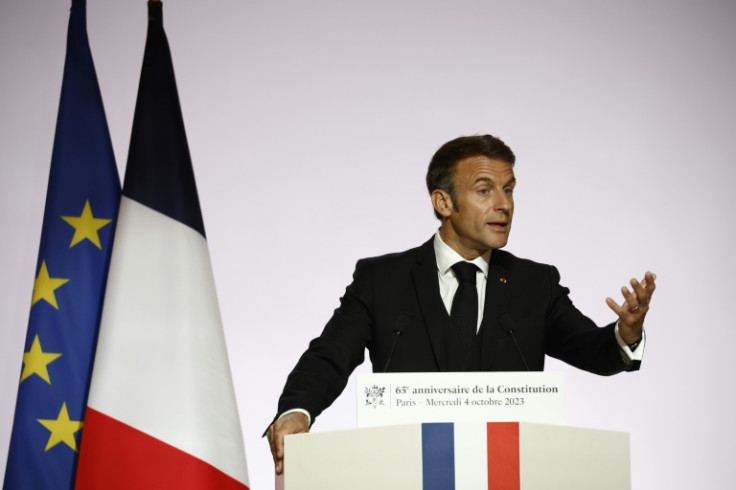France's Macron Promises More Referendums

French President Emmanuel Macron Wednesday vowed to broaden the range of topics that can be voted on in a referendum and ease thresholds for calling a popular vote in a significant constitutional shake-up.
Constitutional rules on the ballots should cover more "important areas of national life", Macron said -- without mentioning immigration, which conservatives and the far-right want to put to the people.
Macron did insist referendums cannot "get out of the rule of law" -- as right-wingers hope to ditch European rules on migration and refugees -- and insisted that the right to asylum remains inviolable.
"The constitution should not be revised in the grip of emotion", he added in a speech to the Constitutional Council on the 65th anniversary of France's 1958 founding document.
Hoping to calm a febrile political situation stoked by his failure to secure a majority at last year's parliamentary elections, Macron also promised the thresholds would be "revised" to call so-called shared initiative referendums (RIP).
The grassroots ballots currently require at least 185 MPs or senators and one-tenth of registered voters to back them before they can go ahead -- conditions so onerous that not one has been held since their introduction in 2008.
Organising an RIP "must be made simpler", Macron said.
But he added that he would not overturn a rule that means referendums cannot be called on a question decided on by parliament in the previous year.
That has prevented left-wing parties from forcing a popular vote on his widely-disliked pension reform.
There should be no "contest of legitimacy" between representative democracy in parliament and the direct democracy of a referendum, Macron said -- warning that otherwise, parliament too could overturn a referendum result.
He cited the example of France's rejection of the planned European constitution in 2005, many of whose elements found their way into the later Treaty of Lisbon adopted by parliament in 2007.
Macron reiterated his objective to secure abortion rights in France's constitution, which he made a priority after the US Supreme Court last year overturned protections for women seeking the procedures.
And he plans further tweaks to give autonomy to the Mediterranean island of Corsica and South Pacific archipelago New Caledonia -- both territories that chafe at rule from Paris.
In mainland France, "we need to rethink our whole territorial architecture," Macron said, promising "a new step in decentralisation" of power.
"Preserving the constitution does not mean setting it in stone," he added.
Macron failed in his first term to get through a constitutional reform that would have added some proportional representation in parliament, reduced the number of lawmakers and limited them to three consecutive terms.
Changing France's constitution requires a two-thirds majority of the combined National Assembly and Senate lower and upper houses, or approval in a referendum.
Some commentators and the hard-left France Unbowed (LFI) party insist more fundamental change is needed to restore legitimacy to the system installed by Charles de Gaulle that concentrates power with the president.
"A revision to the constitution is vital, lest we make a revolution inevitable," public law professor Dominique Rousseau wrote in daily Le Monde on Tuesday.
Jean-Luc Melenchon, former presidential candidate for LFI, blasted Macron's plans.
The president "wants to increase his power so as to circumvent parliament and lock down the popular referendum," he wrote on X (formerly Twitter).
"We need a constituent assembly (to write a new constitution, not the whims of the monarch," he added.
© Copyright AFP 2024. All rights reserved.







